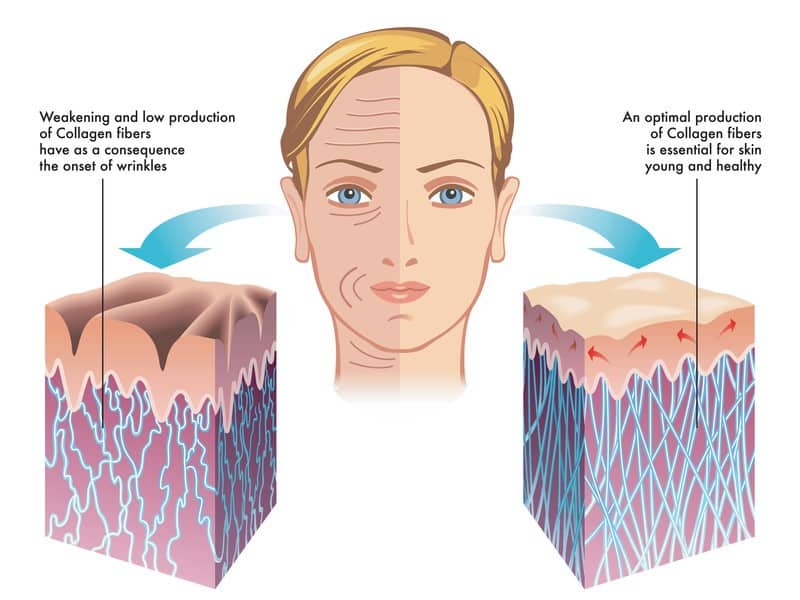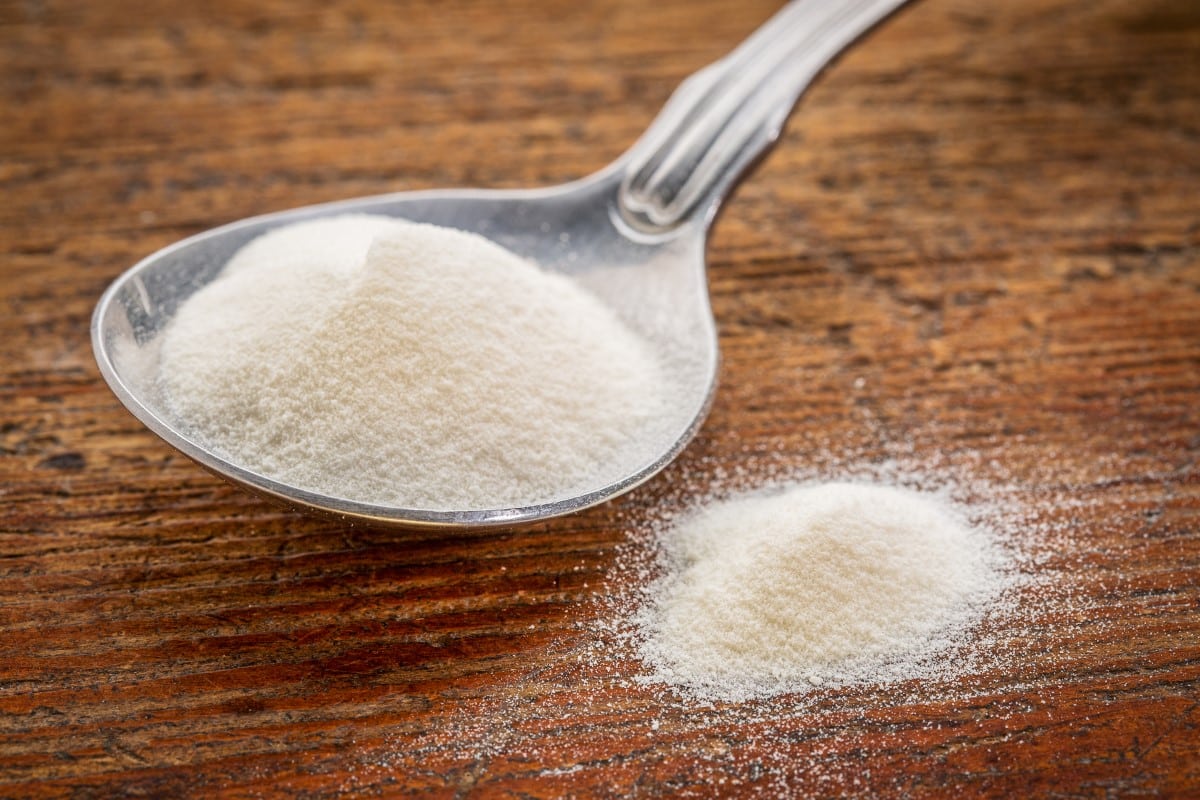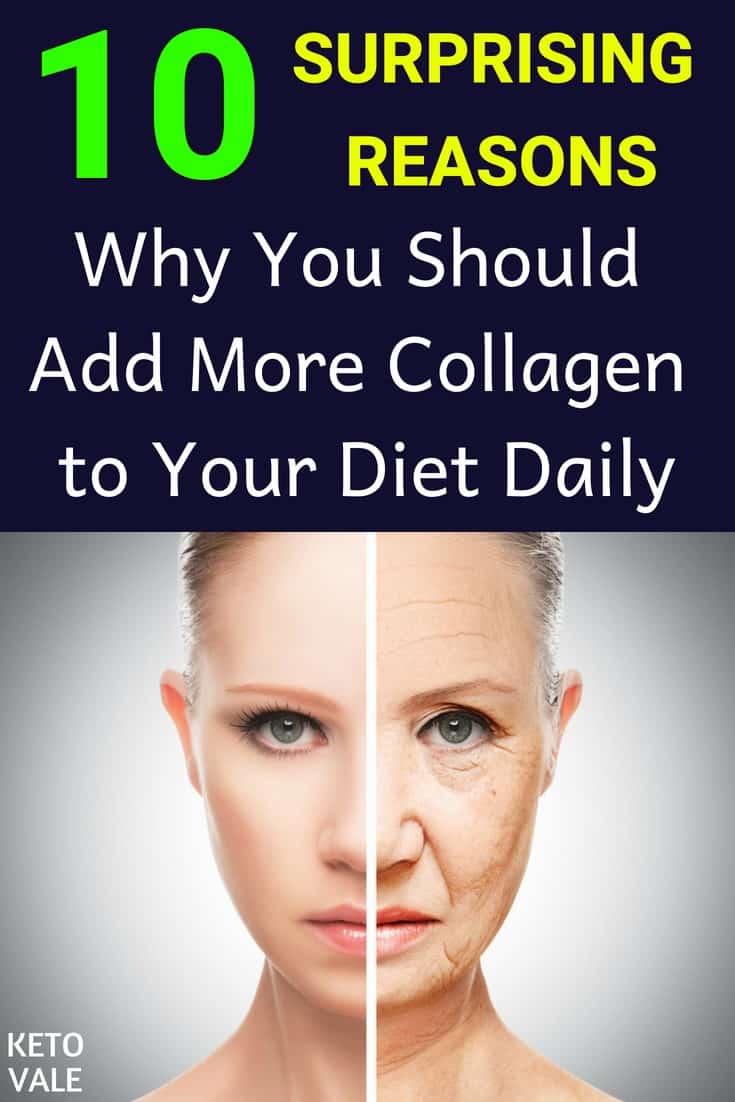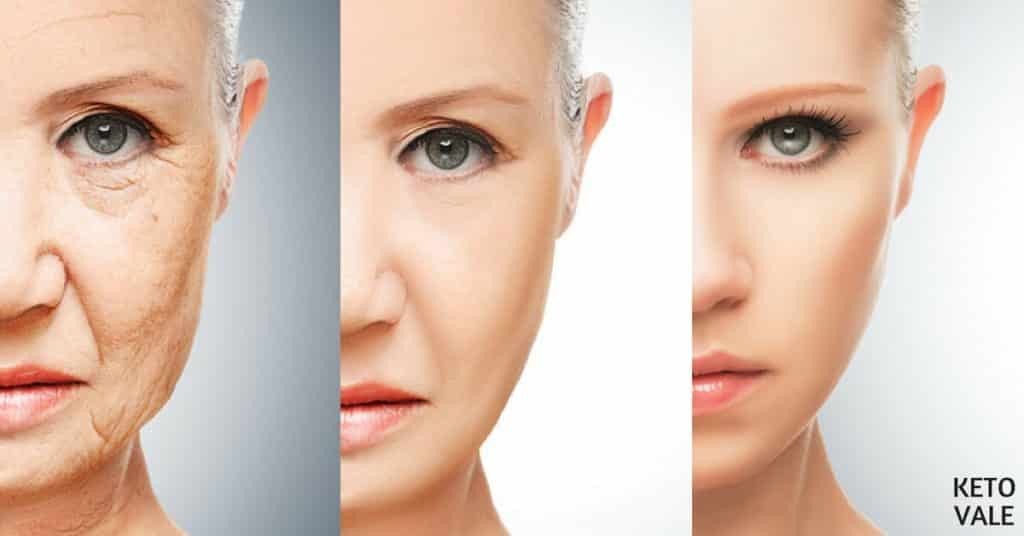Collagen is one of the most important substances for our bodies. It has been quite popular in the beauty industry in the past few decades, but its uses and benefits actually go way beyond that.
Collagen is a type of protein that is present in connective tissues, skin, and bones, but also in muscles (to a lesser extent). It has plenty of different functions in the body, and therefore sufficient collagen consumption has a number of amazing benefits.
The body produces its own collagen – in order to do that, it needs sufficient protein, vitamin C and other vitamins and minerals, which you get from food. Nevertheless, supplementing with additional collagen (or gelatin) can be extremely beneficial, as the body doesn’t produce nearly as much as is needed for optimum health. Plus, production of collagen diminishes with age.
Additionally, a high exposure to sun and pollutants can lower collagen production in the skin, so in addition to supplementing, it’s also essential to protect your skin from the harmful UV rays and from environmental pollution.
Collagen is keto-friendly, as it is a type of protein, and contains no carbs.
Collagen’s benefits are not only for the external body parts, such as skin, hair and nails, but also for our internal health as well.
What is collagen really good for? Here is why adding collagen to your diet is a must if you want optimal health and well-being.
#1. Improves Skin Elasticity And Reduces Stretch Marks and Signs Of Aging
As we age, the body’s capacity to produce collagen diminishes, which is one of the reasons our skin starts to look different with time – soggy, dry, wrinkly and less elastic.
Adding collagen to your diet might greatly improve your skin’s appearance and health, as it will help with elasticity and dryness, thus reducing wrinkles and stretch marks (1, 2, 3).
This will help you look youthful and healthy, and your skin will be glowing.

The collagen structure of your skin is also directly related to the occurrence (or lack) of cellulite, and sufficient collagen will improve the skin’s smoothness and reduce cellulite’s visibility.
Related: Top 23 Low Carb Foods that Help Reduce Cellulite
#2. Improves Hair Thickness And Helps Combat Hair Loss
Collagen has been shown to improve hair thickness, strength, and general hair health. Collagen helps the body with keratin production, the building substance of human hair (4).
In fact, many people report great results from using collagen to combat hair loss, both as a means of preventing it, as well as to help with consecutive hair regrowth.
One of the unfortunate side effects of dieting, especially when done over long periods of time, is hair loss.
This is not caused by weight loss itself but rather by the stress that your body is undergoing – if it has less available energy to maintain itself, some of its non-essential functions (such as hair growth) might suffer.
Not everyone experiences it, but if you’re struggling with that, you should give collagen a try.
One thing to remember, though, is that hair takes a while to grow back, so you need to give it time. New hair will need to grow from scratch, so initially, you’ll just be noticing short hairs here and there; the thickness will come with time.
#3. Improves The Appearance And Health Of Your Nails
If you have brittle, flaky nails, a lack of enough collagen could be the culprit. Nails are made of the same substance as hair, i.e. keratin, and collagen helps with its production in the body.
Collagen will help both with nail growth and strength, so if you’re struggling with nails that break easily, it is definitely worth giving it a try (5).
#4. It Is Important For The Gut And Digestive Health
Collagen can help improve the strength of your gut lining, which is essential for good digestive health. Gut lining serves as a protective barrier between your intestines and the rest of your body, and if it is damaged, food particles can pass into the bloodstream (6, 7).
There are a number of conditions related to that, such as inflammatory bowel disease and leaky gut syndrome, both of which are very painful and difficult to treat. Luckily, collagen supplementation can make a huge difference for people who suffer from these (or similar) conditions.
Collagen is a good source of l-glutamine, which serves as a protective barrier in the gut to prevent potentially harmful agents from leaking through the intestinal lining (8)(9).
Research shows that l-glutamine can also be used to boost immune health and reduce the symptoms of the digestive disorders Crohn’s disease and ulcerative colitis (10)(11).
#5. Helps Reduce Inflammation
Glycine, which makes up 33% of collagen, and is the main amino acid contained in it, is demonstrated to have major anti-inflammatory benefits and to help your body combat different diseases (12).
Additionally, it reduces oxidative stress in people who suffer from metabolic syndrome and helps them stabilize their blood pressure (13).
Inflammation is one of the most frequent side effects of modern diet and lifestyle, so reducing it is definitely a big deal. Research shows that inflammation is the driving force behind many diseases and complications, including diabetes, cardiovascular disease, arthritis and joint diseases, allergies, and COPD (14).
#6. Improves Joint Health And Prevents Joint Degradation And Pain
The health of your joints and connective tissues is an extremely important factor for the quality of your life, and collagen helps with that too.
People who supplement collagen notice less joint pain and increased mobility over time, including rheumatoid arthritis patients, who went into remission after only three months of collagen supplementation (15).
A 24-week clinical trial in athletes who received collagen hydrolysate dietary supplement reported a decrease in joint pain (16).
This is great news for people who suffer from lower back pain that is joint-related, too. And if you’re fairly active (especially if you enjoy hiking and running), you have surely experienced some knee pain in your life, so stock up on collagen to give your knees a break.
#7. Helps You Build Muscle Mass And Control Your Appetite
Collagen is actually a protein (although an incomplete one) and as such, unsurprisingly, it has two very important effects on your body: it helps build muscle mass and induces feelings of satiety. Therefore, collagen can also be used as a protein powder.
Supplementing with collagen, combined with getting enough protein from whole foods, will help regulate your hunger by keeping you full for longer.
Collagen in particular, in combination with resistance training, has been shown to improve body composition in the people who suffer from age-related muscle loss (17).
Arginine, one of the amino acids contained in collagen, boosts the production of the human growth hormone, which is essential for building muscle (18, 19).
#8. Improves Sleep Quality, Mood, And Cognition
The glycine contained in collagen helps improve the quality of your sleep, and even reduces daytime fatigue and improves cognition (20, 21).
Additionally, it has a calming effect and improves mood, and high doses of it have been shown to be effective for controlling OCD symptoms (22, 23, 24).
Are you having a hard time falling asleep since starting keto? It’s one of the side effects of the adaptation process and will definitely improve, but in the meantime, taking some collagen an hour before bed will help you sleep better.
#9. Improves Wound Healing
Collagen helps the body heal wounds faster, and is even used to make wound dressings to serve as a protective barrier and to promote the skin’s ability to repair itself. In fact, it’s one of the most versatile ingredients out there and has been used for centuries (25, 26).
Have you ever wondered why chicken soup seems to be recommended for colds across so many different cultures and nations? It’s usually prepared with chicken bones, skin, cartilages and meat, which makes it high in collagen, and collagen helps your body heal faster. We can still learn a lot from the practical wisdom of some of the traditional healing methods that our grandparents have used.
In fact, previous generations have consumed a diet much richer in collagen, as they didn’t limit themselves to muscle meat, but ate the whole animal.
#10. Improves Bone Strength
One of the most abundant substances in our bones is collagen. This is why collagen plays a major role in bone strength and flexibility (i.e. the bones’ ability to withstand stress) (27).
Making sure that our bodies have sufficient collagen is essential for preserving the health of your bones and preventing fractures. As we age, we produce less and less collagen on our own, which is one of the reasons our bones get more fragile. Collagen can help us maintain a healthy, solid frame (28).

How Do You Get More Collagen Into Your Diet?
Now that we’ve discussed some of collagen’s numerous benefits, you are probably wondering how to make sure you’re getting enough collagen. There are two common ways to do that:
A. Taking Collagen Supplements
Hydrolyzed collagen (collagen peptides) is one of the most popular options, and guarantees optimal absorption, as it is easier to digest than gelatin.
You can also read our Collagen Supplement Buyer’s Guide to learn more about different types of collagen products, what to look for and avoid.
B. Eating Collagen-rich Food
Bone broth is an excellent source of collagen and eating animal skin, cartilage, ribs, oxtails, and connective tissue in general is a great way to consume more collagen.
Store-bought gelatin powder – gelatin is a form of collagen that has undergone less processing and might induce digestive discomfort in some people, but other than that, it’s a perfectly viable option for upping your collagen consumption. Organic gelatin seems to be the best option.
Related: Top 12 Keto-friendly Collagen Rich Foods
Overall, collagen seems to be an important and often neglected component of our diets and making sure you’re getting enough of it will boost your health and help you feel better in many different ways. It is very easy to increase your collagen consumption and benefit from its numerous positive effects, so why not start it today?
What are your favorite ways to add collagen to your diet? Why not try this keto collagen bars recipe to get started?
Enjoy this? Save to your Pinterest for later reference!








